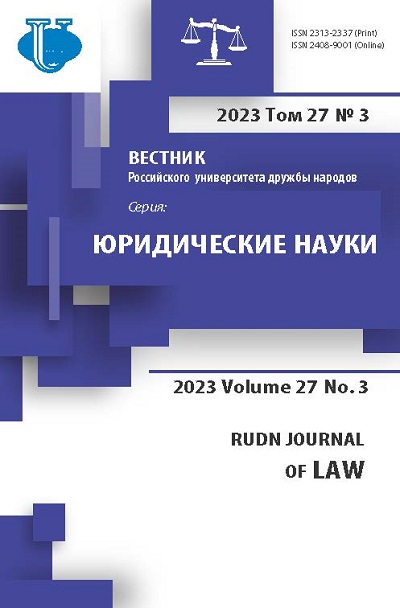Information and digital technologies in jury trial of criminal cases in Russia
- Authors: Petrikina A.A.1, Borodinova T.G.1, Gubko I.V.1
-
Affiliations:
- Caucasus branch Russian state University of justice
- Issue: Vol 27, No 3 (2023)
- Pages: 805-818
- Section: CRIMINAL LAW AND CRIMINOLOGY
- URL: https://journals.rudn.ru/law/article/view/36145
- DOI: https://doi.org/10.22363/2313-2337-2023-27-3-805-818
- EDN: https://elibrary.ru/ISQSWI
- ID: 36145
Cite item
Full Text
Abstract
It is difficult to overestimate the role of the institution of jurors in criminal procedural law, since due to its existence the possibility of people's participation in the justice process is realized. The process of forming the jury bench and their direct participation in criminal cases in practice is possible with the use of various information technologies. In the rapidly changing socio-political situation in society, the participation of representatives of the people in administaring justice is impossible without modern information and digital technologies. The expansion of the scope of jury activities and extension of their competence to the categories of criminal cases under the jurisdiction of not only regional, but also district level, predetermined the study and analysis of problems arising in the formation of the jury panel and organization of their activities in the trial in the traditional and remote format as the purpose of the study. The following tasks are defined: to identify, with the help of information and digital technologies, the reasons for the low activity of the population in realization of the right to participate in justice administration; to determine the strategy for screening candidates and their subsequent preparation for participation in court session; to solve organizational problems of implementing new forms of this institution of criminal justice in the Russian Federation. An attempt has been made to update the scientific position regarding the process of formation and further activities of the jury panel in criminal proceedings based on the available digital and information capabilities. Implementation of the results of the work is possible both for practitioners of the judicial system and for researchers in the field of criminal procedure envolved with formation, development and improvement of the institution of jurors. It can be concluded that transformation of forms of criminal proceedings taking place in the modern world, emergence of new technologies, penetration of digitalization into all spheres of human life have significantly affected the genesis of popular representation in justice administration in criminal cases and become an integral part of it, requiring legal certainty.
About the authors
Anna A. Petrikina
Caucasus branch Russian state University of justice
Author for correspondence.
Email: annapetrikina@yandex.ru
ORCID iD: 0000-0002-3981-4154
Candidate of Legal Sciences, Full Professor, Department of Criminal Procedure law
234 Red Partisans Avenue, Krasnodar, 350020, Russian FederationTatyana G. Borodinova
Caucasus branch Russian state University of justice
Email: borodinovatg@mail.ru
ORCID iD: 0000-0002-2233-6993
Doctor of Legal Sciences, Professor, Department of Criminal Procedure law
234 Red Partisans Avenue, Krasnodar, 350020, Russian FederationIrina V. Gubko
Caucasus branch Russian state University of justice
Email: giv904@rambler.ru
ORCID iD: 0000-0001-5504-9774
Candidate of Legal Sciences, Associate Professor, Department of Criminal Procedure law
234 Red Partisans Avenue, Krasnodar, 350020, Russian FederationReferences
- Alekseev, N.I. (2005) Jury trial as a threat to the Russian legal system. Criminal procedure, (5), 52-59 (in Russian).
- Anzia, S.F. & Berry, C.R. (2011) The Jackie (and Jill) Robinson Effect: Why Do Congresswomen Outperform Congressmen? American Journal of Political Science. 55(3), 478-493.
- Burnham, W. (2009) Introduction to the Law and Legal System of the United States. West Group Company, eJournal USA.
- Fowler, L. (2005) Gender and jury deliberations: The contributions of social science. William and Mary journal of women and the law. 12(1), 1-48.
- Garvey, S.P., Hannaford-Agor, P., Hans, V.P. & Mott, N.L. et al. (2004) Juror first votes in criminal trials. Journal of empirical legal studies. 1(2), 371-398.
- Globenko, O.A. (2007) Juror's notes. Criminal Proceedings. (1), 8-15. (in Russian).
- Johnson, B.D. (2012) Judges on trial. Criminal justice policy review. 25(2), 159-184. doi: 10.2139/ssrn.1028762.
- Kachalova, O.V. (2015). Prospects for reforming the jury trial in the Russian Federation. Criminal procedure. 4(124),16-21. (in Russian).
- Kovalev, N. (2014) Selection of jurors and lay assessors in comparative perspective: Eurasian context. Russian Law Journal. 2(2), 9-62. https://doi.org/10.17589/2309-8678-2014-2-2-9-62
- McCammon, H.J. (2012) The U.S. Women’s Jury Movements and Strategic Adaptation: A More Just Verdict. New York, Cambridge University Press.
- Popova, A.(2004) What is jury - a step to the future or back in the past? Science and life. (7), 56-61. (in Russian).
- Praskova, T.V. (2018) Some issues of jury formation. Russian Justice. 2(142), 94-97. https://doi.org/10.17238/issn2072-909X.2018.2.94-97 (in Russian).
- Rakhmatullina, O.R. (2013) Jury trial as a form of popular participation in the administration of justice: diss. of cand. of legal sciences. Chelyabinsk. (in Russian).
- Shamena, A., Bayer, P. & Hjalmarsson, R. (2019) Politics in the courtroom: political ideology and jury decision making. Journal of the European Economic Association. 17(3), 834-875, https://doi.org/10.1093/jeea/jvy013
- Shamena, A., Bayer, P. & Hjalmarsson, R. (2014) The role of age in jury selection and trial outcomes. Journal of law and economics. 57(4), 1001-1030.
- Shamena, A., Bayer, P. & Hjalmarsson, R. (2012) Jury discrimination in criminal trials. Quarterly Journal of Economics. 127(2), 1017-1055.
- Taylor, G. (2011) Jury trial in Austria. New criminal law review. 14(2), 281-325. https://doi.org/10.1525/nclr.2011.14.2.281.
- Terekhin, V.V. (2018). The reform of judicial proceedings with the participation of jurors and the assessment of the admissibility of evidence. In: Reforming the judicial system of Russia: history and modernity: a collection of scientific papers dedicated to the 80th anniversary of the Nizhny Novgorod Regional Court. Nizhny Novgorod, Avtor Publ. pр. 177-182. (in Russian).
Supplementary files















